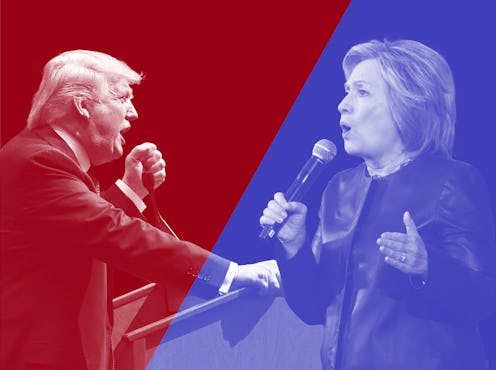News
Americans Want Trump At Their BBQ & Clinton Where?

According to a Quinnipiac University poll published Wednesday, Hillary Clinton has a bare lead over Donald Trump, with 45 percent of support to his 41 percent. Further down in the poll's press release is a statistic that makes me simultaneously really angry and really sad. Voters prefer Clinton over Trump in a crisis (47 to 41 percent), but when it comes to who they'd rather have over for burgers, it flips: 47 percent would Trump as a guest at a backyard barbecue, as opposed to 39 percent for Clinton. The poll also found that more Americans would rather watch Trump on TV for the next four years over Clinton (admittedly, a narrow 44-41 percent). I’m sure a few people tried to tell themselves that choosing Trump for the TV-watching part wasn’t the same as saying they’d rather Trump be president. But come on now. It is.
Hillary Clinton has a problem that's actually more complicated than people simply not liking her. To be sure, people don’t like Trump — his unfavorables are unprecedented for a major party nominee in my lifetime — but it's not in the same way. People who don’t like Trump still like to watch him, in the same way they’d queasily hate-watch the Kardashians or something. People don’t feel that way about Clinton. As a recent North Korea editorial endorsing Trump said, they find her “dull.”
A few weeks ago, Jon Stewart made a well-publicized diagnosis of this problem, saying that Clinton seemed inauthentic and “not real to [her] personality.” Washington Post writer Chris Cillizza then expanded on why this struck such a chord, highlighting the terms often used to paint the word cloud of Clinton’s demeanor: “clunky,” “formulaic,” “guarded,” “inauthentic,” “rehearsed.” Like Stewart, he devoted many, many words to how intelligent, quick-thinking, qualified, and knowledgeable Clinton is, all while clearly setting up a massive nullifying “but …”
To be clear, Clinton is not everything I want my ideal presidential candidate to be. She can certainly be too hawkish for my taste, and the seemingly avoidable email headache is getting to me. But as for her “clunky” persona, I do not now, nor will I ever, care. The race for the office of president of the United States is not a personality contest, nor a likability contest, nor a contest in "relatability" — that most irksome of terms. But voters are treating it like one.
I have no time for people who don’t even really believe in the things Trump is saying, but want him to be president because "It’ll be good TV.” The idea that it matters whether a presidential candidate is entertaining, as opposed to just good at their job, is a false positive. It matters because people have a weakness for “good TV,” and the lowest common denominator (as Stephen Hawking called it) being played to, but underneath that, it doesn’t hold any actual meaning. Why are the Kardashians famous? Because they are.
If you don’t want Trump to be president, it doesn’t matter whether or not you deem Clinton “relatable” enough for you. The people who want Clinton to be there when disaster strikes but won’t invite her to their barbecue? The people who joke that they’re going to vote for Trump “just to see what happens”? I believe they are at least partially responsible for fueling the culture that has allowed Trump to flourish. I wonder if they will be as entertained come November.
Image: Bustle/Caroline Wurtzel